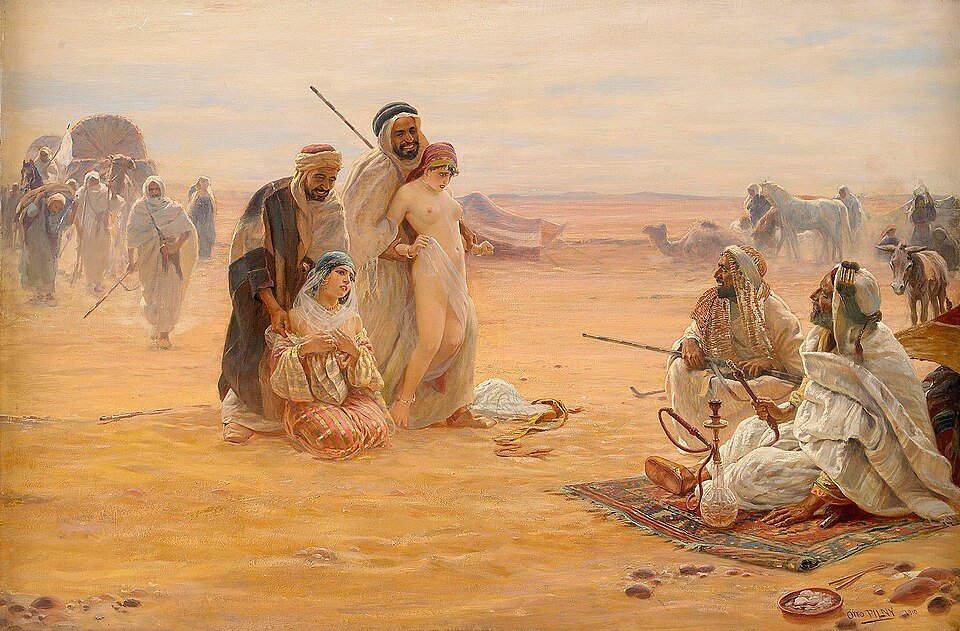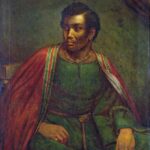Slavery’s legacy is a shared human tragedy, and no civilization can claim moral superiority.
Slavery, the abhorrent practice of owning human beings as property, has stained the chronicles of history across civilizations and continents. From the ancient cradles of civilization to the modern era, the exploitation of human labor has been a grim constant. This article delves into the multifaceted history of slavery, examining its manifestations in various cultures, the role of different societies, and the eventual abolition movements that sought to eradicate this blight. Additionally, it addresses the contemporary push for reparations, arguing that such measures are misguided given the universal nature of historical slavery.
A global overview of slave-owning systems
Slavery’s roots stretch back to the dawn of civilization. In the Ancient Near East, societies like Mesopotamia and Egypt relied on slaves for agriculture, construction, and domestic service. The Roman Empire built its vast economy on the backs of millions of slaves, who comprised up to 20% of its population at its peak. The Atlantic Slave Trade, orchestrated by European powers from the 15th to the 19th centuries, forcibly transported approximately 12.5 million Africans to the Americas, fueling colonial economies.
The Muslim World stands out by far for the longevity and scale of its slave trade. Over more than a millennium, from the 7th to the 20th century, Islamic societies enslaved an estimated 11–14 million Africans, alongside millions from Europe and Asia. The Ottoman Empire, a prominent Muslim power, perpetuated slavery for six centuries, utilizing slaves in roles ranging from military service to domestic labor.
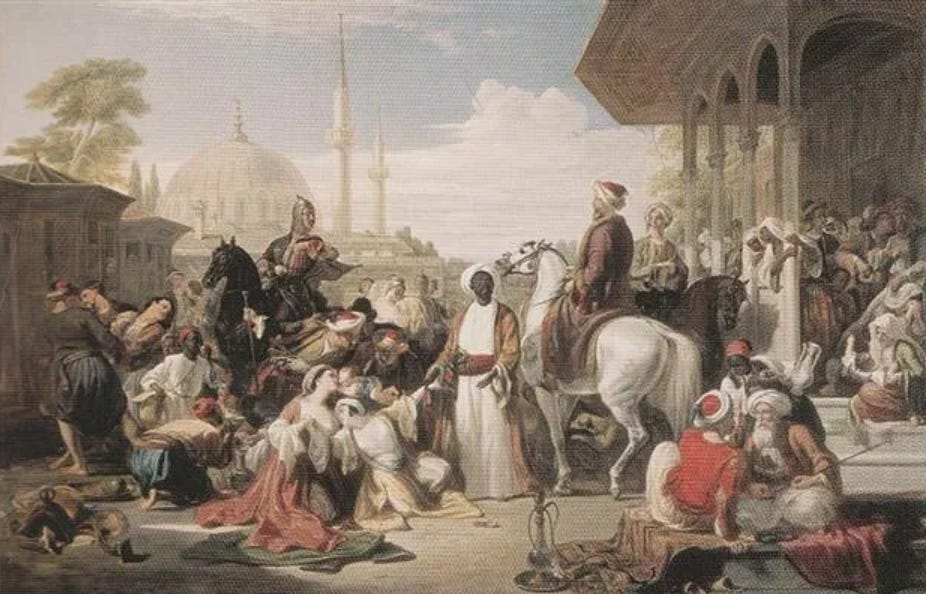
Slavery in the Americas
In the Americas, slavery took on various forms. In North America, the brutal plantation system, particularly in the southern United States, relied heavily on African slaves who toiled under inhumane conditions. South America, notably Brazil, also depended on African slave labor for its sugar and mining industries.
Lesser-known is the practice of slavery among Indigenous Peoples of the Americas. Many Native American tribes, such as the Cherokee and Creek, held slaves, often acquired through warfare or trade with Europeans. These systems varied: some tribes integrated slaves into their communities, while others treated them as property.
Africa: a continent entangled in slavery
Contrary to popular narratives, slavery was not solely a European imposition on Africa. The continent had its own entrenched systems of slavery long before European contact. African kingdoms, such as the Ashanti and Dahomey, actively participated in the slave trade, capturing and selling fellow Africans to European and Muslim traders. This internal slave trade persisted even after the abolition of the transatlantic trade, highlighting the complexity of Africa’s relationship with slavery and demonstrating that black populations were complicit in perpetuating the practice.
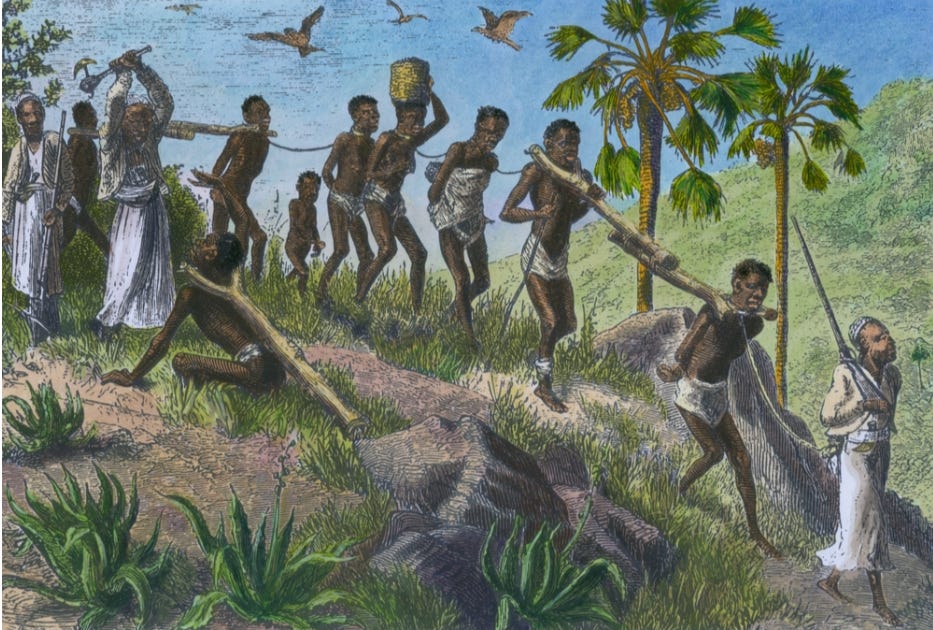
Asia: slavery in China and India
In China, slavery dates back to ancient times, with slaves used in agriculture, households, and even as human sacrifices during early dynasties. The practice continued through various periods, though it was less centralized than in other regions. India presents a unique case with its caste system, which, while not identical to slavery, enforced a rigid social hierarchy with parallels to servitude. Historical records also indicate chattel slavery in India, particularly in agriculture and warfare, often involving captives from military campaigns.
The Islamic world: the longest and most extensive slave trade
Among all slave-owning civilizations, the Islamic world stands out for the duration and extent of its slave trade. Spanning over 1,200 years, Muslim societies enslaved millions from Africa, Europe, and Asia through the trans-Saharan, Indian Ocean, and Eurasian trades. This vast network supplied labor, soldiers, and concubines across the Islamic world. Notably, the Vikings, often romanticized as explorers, played a significant role by kidnapping white Europeans—including from the British Isles—and selling them to Muslim markets, contributing to a diverse pool of enslaved peoples.
The British Abolition Movement
Despite the current trend of vilifying the British Empire, it was the English who spearheaded the global abolition of slavery. William Wilberforce, a devout Christian and Member of Parliament, led a tireless campaign against the slave trade. His efforts culminated in the Slave Trade Act of 1807, which outlawed the British transatlantic slave trade, and the Slavery Abolition Act of 1833, which emancipated slaves across most of the British Empire.
The British enforced these laws with remarkable resolve. The Royal Navy established the West Africa Squadron, which patrolled the Atlantic, intercepting slave ships and liberating over 150,000 enslaved Africans between 1807 and 1860. Diplomatic pressure was also applied, compelling other nations to abolish slavery through treaties and economic incentives. This enforcement marked a significant shift in global attitudes and set a precedent for abolition worldwide.
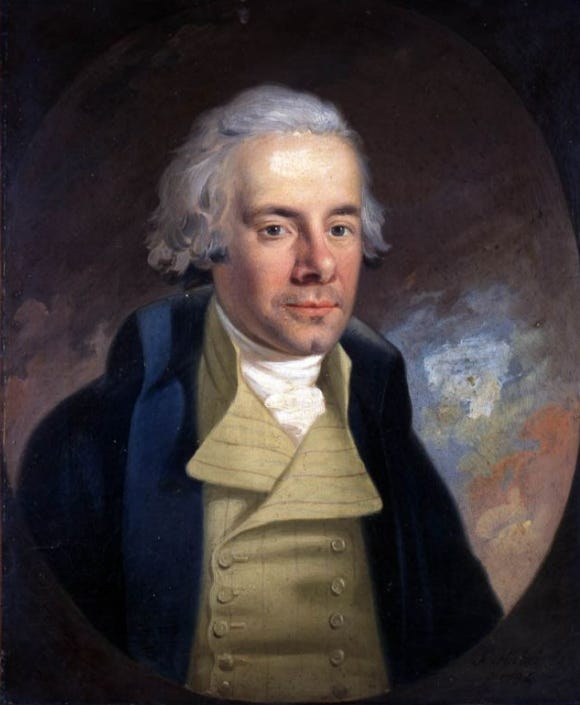
The fallacy of reparations
In recent years, for a long time having nothing useful or meaningful to say, the progressive left has pushed for reparations to address the historical injustices of slavery, particularly in the context of the Atlantic slave trade. However, this approach is fundamentally flawed. Slavery was a global phenomenon, perpetrated by virtually every civilization at some point in history. From the ancient Greeks and Romans to African kingdoms, Asian empires, and Islamic societies, the practice was universal.
Determining who should pay reparations and to whom would be an accounting nightmare. Should modern-day Africans pay for the role their ancestors played in capturing and selling slaves? Should the descendants of Vikings compensate the British for their raids? Should Middle Eastern nations account for centuries of Islamic slavery? The questions multiply, and the answers remain elusive.
In addition, there is a deeper issue at play: the manipulation of historical narratives for political purposes. In the unholy alliance of red and green, accompanied by Machiavellian global super-powers, they have seized upon the history of slavery to advance an agenda aimed at weakening Western societies. Through a campaign of half-truths and selective history, they implant self-doubt, guilt, and self-hate in Western nations, focusing exclusively on the sins of the British, Americans, and other Western powers while ignoring the global reality of slavery.
This narrative is not only historically inaccurate but also dangerously misleading. As this article has shown, slavery was a universal scourge, practiced by civilizations across the world for millennia. The Islamic world’s slave trade, for instance, was the longest and most extensive in history, yet it is often glossed over in these discussions. As long as Qatar or Saudi Arabia spends billions on buying favors at Western universities, it is questionable whether these institutions and the connected intelligentsia will ever uphold integrity, and the new generations are indoctrinated as a result.
Similarly, the role of African kingdoms in capturing and selling slaves, or the indigenous slave systems in the Americas, are conveniently omitted from the conversation. By presenting slavery as a uniquely Western evil, these forces seek to erode the cultural confidence of Western nations, suffocating them in guilt and self-loathing. This is not a genuine reckoning with history but a strategic effort to diminish the West’s global influence. The truth, however, is that slavery’s legacy is a shared human tragedy, and no civilization can claim moral superiority.
To focus solely on the West is to distort history and undermine the lessons it offers for all of humanity.
Listen to an extended audio conversation on this topic on Popular Beethoven’s YouTube channel – supported by AI!
